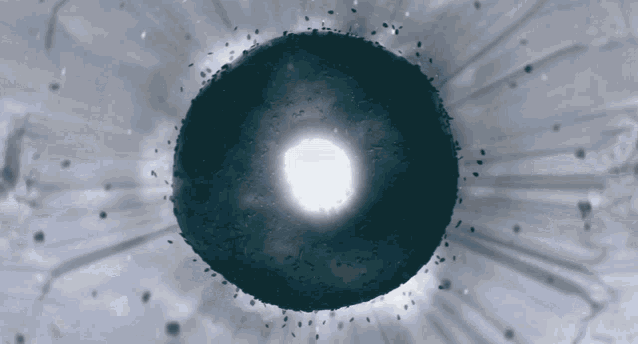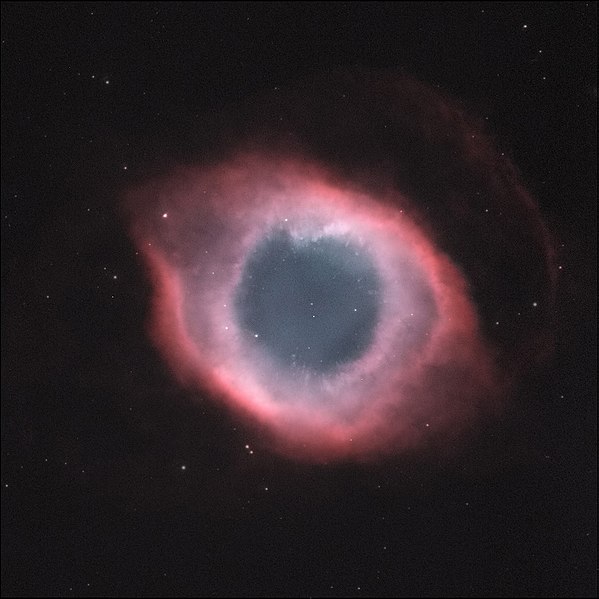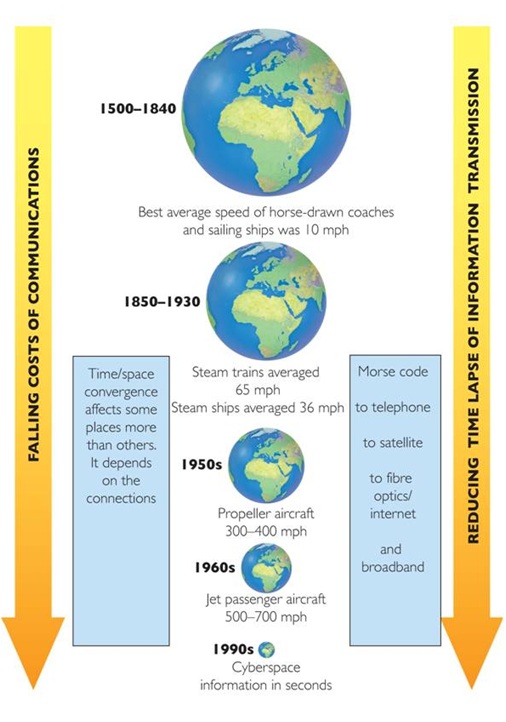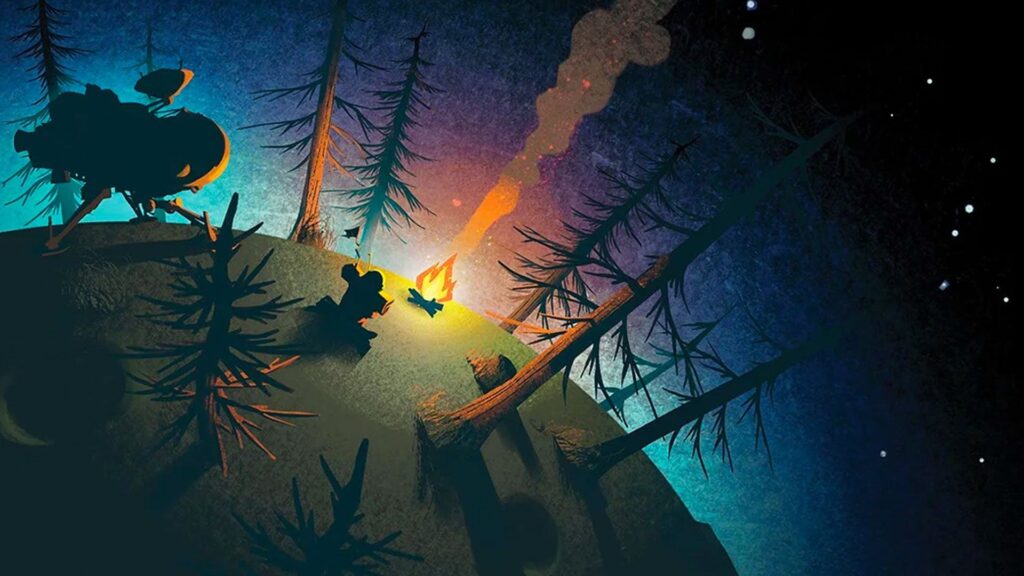Outer Wilds: The Transformative Power of Uncertainty and Faith
Part 5: The Uncertainty and Possibility of God

Outer Wilds ends with the journey into the Eye of the Universe and the creation of the next universe, but the real impact of Outer Wilds is its ability to linger beyond those end credits and stay with people in a meaningful way.
At the beginning of this essay, I argued that Outer Wilds provides a living mythology that naturally fills the void of traditional faith and religion in the modern age.
That’s a substantial claim, one that requires more exploration beyond the events of the game and the themes it explores. This final section must go beyond the game’s narrative and venture into why our current spiritual and postmodern culture offers the perfect fertile soil for the seeds of illuminated faith to grow. Lastly, why its necessary for these seeds to be tended.
The previous section looked at the decline of traditional faith and religion among the general population worldwide. It’s easy to understand why participation in religious communities has waned in recent years, but it’s harder to predict the effect of this, positive, negative, or otherwise, on individuals and collective communities.
According to Pew Research and other similar studies, religion is positively associated with life satisfaction, happiness and morale in 175 of 224 studies (78%).
In another study, the NIH found that people with no religious affiliation experience higher rates of depression which may be “due to the absence of social support from a faith community or lack of commitment to a belief system that makes sense of traumatic events and difficult life stressors.”
I can attest to this. When I was in college, my dog Draco died suddenly of Leukemia. I was in New York, he was in Florida. I never got to say goodbye and it hurt in a way that I could not explain. The thought that kept stabbing at me was that I could never encounter him again. That he could never interact with me again. I had stopped believing in heaven for a long time by then.

My pain would have been tempered If I had believed in a heaven for all souls by the understanding that my dog’s essence would be waiting for me somewhere eternal. The thought that Draco would be in a beautiful meadow, and that before he could perceive any time passing, everyone he loved would join him was a wonderful thought. But I could not believe in such a paradise.
The result was struggling with the pain of knowing that a life you can love so much, a life bursting with a galaxy of personality and quirks and emotions, can be snuffed out like a candle, leaving only traces of its time alive.
I’ve face greater losses since Draco’s death, but my ability to accept the uncertainty of it all has thankfully also grown.
I tried to convince myself that the comfort I could gain from such ideas were enough of a reason for me to believe in them. But I couldn’t bring myself to believe in this hopeful possibility with any conviction. The best I could do was find some crumb of solace in to the possibility that any afterlife was beyond comprehension, something I am still open to.
Many skeptics have become great at skating around the abyss of nihilism, familiar with the its call, but unwilling to fall into that pit. When individuals are forced to confront profound uncertainties or disillusionment, their skepticism may extend beyond questioning specific beliefs to challenging the very foundations of meaning. The absence of satisfying answers to existential questions can cause skeptics to fall into that nihilistic void. Here, the perceived absence of inherent meaning or value in life becomes suffocating.
Nihilism asserts the meaningless of existence. It can be intellectually stimulating to strip all morality, purpose, spirituality, and knowledge of its meaning and worth, but arriving at the conclusion that nothing matters and everything is pointless is not physiologically compatible for most people with a life of purpose and satisfaction.
The film “Everything Everywhere all at Once” provides a more cheerful version of nihilism, asserting that if we can arrive at the conclusion that nothing matters and we are all insignificant in the grand scheme of things, then we can stop taking ourselves and the things we worry about so seriously and just enjoy the absurdity of being alive.

This belief is similar to spiritual practices like Buddhism that are primarily concerned with finding the least painful path through life by detaching oneself from the sources of suffering and finding acceptance with the cycle of life, death, and all the joy and suffering that color all moments in between.
Approaches like this are valid ways to deal with existential dread on an individual level, but the solace they offer tend toward inward peace. These beliefs do not offer a guiding light or a framework for a community, there is no mission or purpose to work forward. If the solution to life’s problems is found in life’s meaninglessness, then that’s a tough pill to swallow.
Christianity, on the other hand, offered a much more promising offer when it came onto the scene around 40 C.E. It did two things which fulfilled two major human needs. First, it offered a salve for much of life’s suffering and trouble, and secondly, it made a great promise and laid down a mission for its adherents to follow.
The revolutionary idea at the time that anyone could attain salvation and eternal life fueled the religion’s growth among the underserved and the downtrodden of the Roman Empire. It didn’t matter if you were a thief, a beggar, a prostitute, or a murderer, because all could be forgiven and cleansed. It offered a reprieve from shame and guilt, and most importantly, an unmatched reward: an escape from death.
The promise of eternal life meant that death was no longer the great leveler, but simply a transition from mortal life to eternity. The quality of this eternity would hinge upon the choices you made in life, and whether or not you accepted Jesus as your lord and savior and followed the terms of the New Covenant. If you fulfilled your mission as a Christian, you would reap the ultimate reward of eternal life in paradise. Failing to do so could land you in a number of unpleasant fixes ranging from the mild suffering of purgatory to the agony of endless torture in hell.
As an agnostic, I am not endorsing or bashing any religion or spiritual belief, I am only interested in how these beliefs affect the people who believe in them and those who don’t. As stated earlier, certain beliefs do yield undeniable psychological benefits. There are massive practical benefits to having faith in any belief that can can minimize suffering, shame, guilt, and the fear of death.
If we could all reap these benefits that would be wonderful. But powerful beliefs can come with powerful baggage, and less people are willing to accept the baggage that comes with these beliefs.
Allow me to shift the focus back to Outer Wilds, since this is where it all comes together. I’ve argued how Outer Wilds charts a path of illuminated faith that does not become weaker when confronted with uncertainty, but draws its strengths from it. This is a concept that is not limited to confines of the game, but one that allowed explorers and scientists to make their most courageous leaps into the unknown.
All of this allows for one final hypothesis: the ultimate uncertainty of the limits of our knowledge also allows for the ultimate possibility: the creation of God.
The game is not subtle with its ending. The explosion of light that signals the creation of a new universe can be seen as a new big bang, the widely accepted scientific theory that the universe began from an explosion and subsequent expansion from an initial state of high density and temperature. The game also suggests that this new universe does not arise by change alone, but instead is created by a divinity though its will: the mind of the Hatchling harnessing the immeasurable cosmic powers of the Eye of the Universe. The name of the song that plays in this part of the game is named “Let There Be Light,” an allusion to God’s words when creating the world first written in the Torah.
To further cement the interconnectedness of science and spirituality in the big bang theory, it was a Roman Catholic priest and physicist Georges Lemaître, who first proposed it in 1927.
Outer Wilds allows the protagonist to ascend to something akin to a God with the help of the ultimate power of uncertainty of the Eye of the Universe, and then ends when the new universe is created. The game offers no explanation as to what happened to said God in the new universe.
Did the hatchling/God cease to be? Do they now tend to the new universe with care and look over its inhabitants with care? This isn’t a question limited to Outer Wilds, but one of the biggest, if not the biggest question asked by humanity.
This is our God problem.
God either exists, or doesn’t. Frankly, there’s no way to prove either option with complete certainty.
Of the two options, the first is much simpler as the existence of God raises a lot more mysteries.
There are two main camps that people who believe in the existence of God fall into:
- People who believe in a present and active God
- People who believe in an absent or passive God
The first group believes in a higher power that exists in the present, and has the power and the will to shape the world and the fates if its inhabitants. Abrahamic religions believe in such a God.
The God of Abrahamic faiths, of Judaism, Christianity, and Islam is an all-powerful, all-seeing, benevolent being who created and guides the fate of humanity. This God is creator and judge, laying a series of promises and guidelines for his followers to adhere to with the help of mortal prophets, and punishing those who stray from these commandments.
Greek philosopher Epicurus was among the first to record the biggest challenge to this belief: “Is God willing to prevent evil, but not able? Then he is not omnipotent. Is he able, but not willing? Then he is malevolent. Is he both able and willing? Then from whence comes evil?”
This question known as the problem of evil has had many different forms and answers throughout history, but it remains the single largest obstacle for theologians to answer in a way that satisfies the observation that the world is teeming with injustices that any higher-power has yet to intervene directly to fix.
There are a lot more variations to the alternative explanation that God does or did exist in some form, but is neither active or willing to intervene.
One explanation is that some divinity did create the universe and left its awesome handwriting in the form of the elegant laws of physics and their observable beauty, but no such being has a role in actively watching over or interfering in the development of it after this initial state of creation.
But there are other explanations:
- God got bored and left.
- God is actually morally capricious and sometimes helps, sometimes hurts, or just doesn’t care
There are different psychological and cosmic implications to all of these beliefs, but its hard to argue that any provide as much reassurance as the belief in a present an active benevolent God. Even with the problem of evil, its easy to see the allure of the belief in a higher power watching over us and, like a loving parent, illuminating a path to a better future.
This is wonderful news for believers in such a God but where does it leave people like me who cannot believe in such a thing, despite its appeal?
Is it possible for a belief to exist that can offer the same comfort, guidance, and hope without the necessity to believe in the active guidance and judgment from an all-powerful God?
There is one alternative, an alternative the Outer Wilds seems to suggest, which is the necessity to create God.
The one striking observation that fueled the search for the Eye was that it was older than the known universe. This suggests that the universe that is dying during the events of Outer Wilds was not the first universe in existence, and the ending proves that it won’t be the last.
This implies a cyclical nature of death and rebirth, each universe is allowed the freedom to grow, develop, and evolve, its inhabitants free to discover its mysteries. The thread that weaves all universes together in a chain of continuity is the Eye of the Universe.
We can assume that the Eye is present in every subsequent universe, its signal transmitting out to the farthest reaches of space, waiting for some civilization to hear it and to answer its call. Finding and reaching the eye is not an easy task. It requires the development of advanced technologies only made possible by the careful rigor of scientific progress and the guiding light of illuminated faith.
For any society to reach out and touch the power of the Eye, they must first learn how to master the hearth, fuel their hearts with the flames of discovery, and then temper those passions with the discipline of experimentation. It requires generations upon generations of preservation, collaboration, and growth.
We know what happens when a conscious observer reaches the eye. All time, space, and possibilities collapse, and the conscious observers can then wield the powers of the Eye to usher in a new big bang and continuity the cycle of renewal. The game suggests that this observer’s mission ends at the end of their universe. They send a spark out into the darkness and now its up to the new inhabitants of the next universe to find the Eye in their time.
There was never a moment in Outer Wilds where the observer that entered the Eye in the previous universe and triggered to the creation of this one made themselves known or offered any guidance. If this was the case, what would have stopped this “God” from undoing the Owlk’s containment of the Eye’s signal? What would have stopped them from simply communicating with the Nomai and giving them the coordinates of the Eye so that they could have succeeded before their untimely death?
The game suggests that any divinity that is created from merging a conscious observer with the Eye of the Universe is simply tasked with ushering a dying universe into its next iteration.
The implication of this alone is fascinating. The Eye of the Universe seems to hold the power of infinite possibilities within, but it has no will of its own to choose any one of these possible outcomes. It simply exists as a “mindless” force, a raw collection of uncertainty.
Meanwhile, the universe is able to change and develop until the conditions are right for conscious beings to rise out of the chaos of this uncertainty. This consciousness has a will that the Eye lacks, but it lacks the sheer power that the Eye holds. It would seem that consciousness is desired outcome in this universe, something reinforced by the inclusion of the Uncertainty Principle in the game, which relies on observation.
Outer Wilds is not the only creative work to pose this idea that the natural evolution of the universe is a journey toward the creation of some God or divinity that either does not exist now, or exists in fragments.
Isaac Asimov wrote an incredible short story called “The Last Question” which was my first introduction to this idea. I highly recommend reading it before I spoil it below.
This short story is about humanity contemplating the inevitable heat death of the universe through entropy and asking their most powerful computer at the time if there was a way to reverse or stop entropy. The computer considers the question, and concludes “THERE IS AS YET INSUFFICIENT DATA FOR A MEANINGFUL ANSWER.” This process repeats, with humanity asking more advanced versions of this computer the same question. Each time they ask the answer is always the same. Both humanity and the computer evolve until they resemble something close to a divinity, minds free of any physical constraint, united and expanded beyond recognition, but still the computer cannot solve the problem of Entropy.
It is only in the last seconds before the total heat death of the universe, just as the final flicker of light dies, that the computer can crunch every single point of data in the universe from beginning to end. It thinks about the final question one last time, but this time, it has all the information, and because of this, finally has an answer.
The computer speaks “LET THERE BE LIGHT!” and the story concludes: “And there was light –“
I immediately thought of this story when I finished Outer Wilds and wondered if the game’s developers had been inspired this story.
“God’s Debris” by Scott Adams poses an interesting thought experiment: what if God killed themselves to create the universe, and all matter in the universe is simply God’s debris, all of it being guided by an unseen force to re-create itself out of chaos?
Panpsychism is the belief that all things in the universe “have a mind or a mind-like quality.” One form of this belief wonders if the universe can be thought of one giant developing brain, with each aspect of the universe that increases in its complexity helping this giant mind expand its ability to understand and gain consciousness.
Outer Wilds, however, goes beyond most of these creative works, thoughts experiments, and explanations. It doesn’t just muse about the possibility of creating God from the chaos of the universe, it insists that it’s imperative to.
What if the Hatchling were to have failed in their quest to reach the Eye?
Its possible that some other civilization could have reached the Eye eventually before the death of all stars.
But what if nobody had reached the Eye?
It’s logical to assume that if no conscious observer had entered the Eye in time, that the universe would simply die. With the powers of the Eye untapped, a new universe could not be created without an observer to harness the possibilities of uncertainty.
This sounds like a terrible fate, but it’s the current reality we face. There is no realistic solution to entropy. Our understanding of the cosmos relies on our acceptance that 1.7×10106 years, that’s 170,000,000,000,000,000,000,000,000,000,000,000,000,000 all activity in the universe will cease and the universe will reach a temperature of absolute zero.
That’s a mind-boggling span of time that we or any of our ancestors are unlikely to see. So why bother even worrying about it?
The Eye of the Universe, and the power it holds is more than a universe jump-starter machine. This plot device is a symbol to the promises and possibilities of discovery.
None of the civilizations in Outer Wilds pray to a God to guide them, instead, they chart their own way into the unknown. With each major achievement such as instantaneous warp travel, the ability to create a dream like simulation, or the ability to detect signals from others starts, the civilizations in Outer Wilds become closer to a divinity themselves.
Finding and interacting with the Eye is simply the final challenge, one last puzzle to solve before the ability to re-make the universe after its heat-death is possible.
And given the choice between letting the spark of creation blossom into a new universe, or letting the universe die a long quiet death, who in their right mind would choose the latter?
Obviously, solving the heat death of the universe is not the most pressing issue at hand. We still kill one another in large numbers for arbitrary reasons, mistrust one another for arbitrary differences. We have yet to eradicate the kind of greed that perpetuates levels of economic inequality that forces some to steal or starve while others amass unimaginable amounts of wealth. We have yet been unable to defeat the dangers of misinformation, or prevent the rise of unfounded conspiracy theories.
Unlike the Hearthians who have found a way to peacefully co-exist with the natural beauty of their planet, we continue to destroy Earth’s delicate ecosystems in the name of “progress.” Those doing most of the harm seem to have little interest in the long-term consequences of these actions.
All of these threaten our very right to exist peacefully and with dignity on Earth. So why should any fanciful ideas of uncovering cosmic mysteries appeal to us now?
The reason is purpose.
It is well documented that people who have a significant purpose in their life live psychologically healthier lives than those who don’t. It was Nietzsche, the father of nihilism himself who once wrote “those who have a ‘why’ to live, can bear almost any ‘how.'” Beyond the individual benefits, its been moments of shared purpose, of a common drive towards a distant goal that can hold communities together and create strong bonds that can define cultures over many generations.
Those who have strong convictions in a traditional faith will often find this purpose in the mission and commandments of their church and holy scriptures. People do not become missionaries and spend their free time trying to convert others to their mission if they did not believe in it with real purpose and passion. These kinds of passions and devotion that can create breathtaking temples and cathedrals, can shift the course of history, and unfortunately, can also give rise to wars and violence in the name of this higher purpose.
Humanity will always yearn for a higher purpose, and this itch has traditionally been filled by the religion and institutions of faith. The cosmic mission they offer does not compare to other earthly endeavors in terms of scale or ambition.
But what of the people for whom faith has never been an answer to this itch? What of the growing number of people on the planet who reject the promises found in ancient texts, but still crave a similar sense of purpse?
The universe can feel cold or quiet to those who look out and cannot see God working all around us. It can even seem indifferent to our presence.
Yet, the reason why so many people find a sense of spiritual connection to Outer Wilds is because it tells us that we have only begun to scratch at the surface of the universe’s real mystery and possibilities. It reminds us that the closer we look at the most microscopic or farthest reaches of the universe, the more mysterious it becomes. The universe’s true cosmic mysteries are not just recorded in old ancient texts, but are out there, still waiting to be found.
We have only begun to scratch the surface of quantum and particle physics, cosmology, and relativity. Only started to peer into the origins of our universe.
These ideas might only seem relevant to the scientists who study the frontiers of knowledge. It would be easy to believe that the only people who can or should find their purpose in such mysteries of science are those who devote their lives to researching them.
Traditionally, yes, but let’s imagine ourselves like the Hatchling in Outer Wilds and the Nomai as the scientists of our world. The Hatchling cannot and does not perform any of the advanced science that Nomai engaged in to build their technology and experiments. The most powerful tool of the Hatchling is the translator, enabling them to understand the Nomai’s written records. With the power of translation, the Hatchling can understand the overall mission, hopes, and objectives of the Nomai. You become empowered by their knowledge, and this knowledge allows the chain of illuminated faith to guide the Hatchling to what the Nomai could not find on their own. The path is what allows the Hatchling to perpetuate the cycle of life, death, and rebirth. The promise of renewal is rendered through uncertainty.
In Outer Wilds, the Eye of the Universe represents the most powerful mysteries of the universe in one spot. We haven’t detected any object like the Eye of the universe, so then what is the point of all of this knowledge if it just seems to lead to more questions? Without an Eye to aim for, can people in search of spiritual purpose ever find something as close to powerful as what the traditionally faithful have?
This is where illuminated faith must take over. Science promises a road to discovery, but it cannot promise what is at the end of that path or if that path even has an end. The only certainty in the journey of discovery is uncertainty. Fortunately for us, we have come to learn that uncertainty and possibility are one and the same. With great uncertainty, comes great possibility, and this possibility can rival the lofty hopes and promises of traditional faith.
Even if there is no God now, who is to say God cannot exist one day if we commit to a mission of discovery.

That sentence might sound blasphemous to some readers, but consider the following question. What is the purpose of God, and in what ways might we, or some more advanced intelligence that might one day exist thanks to our efforts, accomplish those same purposes without relying on divine intervention?
Some faithful believe there is a God that provides for his people. Might we one day solve the problems of hunger and access to ensure that nobody on Earth suffers from hunger or basic needs?
Some believe that God can bring about an end to violence and usher in world peace. Might we one day achieve this by devising innovative ways to empathize with one another, or disarm our deadliest weapons?
There are solutions to problems at a scale that might unimaginable now, but might one day be within our grasp.
Could we ever achieve immortality, expand among the stars and live in harmony with the cosmos, make peace with death, could we separate physical and mental death? Should we?
Is it possible that the impregnable event horizon of a black hole might hide similar mysteries and possibilities than those of the Eye of the Universe?
Can we ever reverse the force of entropy and prevent the eventual heat death of the universe? Or maybe we can send a spark into the darkness to ensure that another universe can blossom after the end of this one.
Outer Wilds is one of the stories that dares to say its possible. It won’t happen by some divine intervention, but by the efforts of science and the careful light of illuminated faith guiding generations through a sense of shared purpose and hope.
Outer Wilds resonates with many people, myself included, because it offers up the gift of wonder, possibility, and hope normally only found in spirituality bound by the confines of traditional faith. It does so without asking the player to place their belief in anything other than the blessings of progress offered by science and the promise of possibility offered by the universe. This is the heart of illuminated faith.
Many fundamental believers of traditional faiths reject the hard earned truths of science out of fear that they diminish or contradict their beliefs. Illuminated faith asks us to embraces these truths, because any new truths can only strengthen an illuminated faith. In a world informed by Illuminated Faith, there is no divinity doling out rewards or punishments, life is not predetermined by fate or any kind of certainty, there exists possibility of greatness, but only if minds can work together to collaborate and achieve things greater than any individual can.
It is easy to feel small and trapped in a world that feels too connected. It sometimes feels like all the magic and mystery of the world is gone, every corner of our planet explored, and all the magic and myth has been explained away into stark facts. No fairies, angels, battling gods in the heavens, spirits.

But it’s important to remember that there is still great mystery out there, great unknowns, things that make modern humans as small and powerless as the ancient ancestors were to the thunder and lightning that made the sky shake.
For many people, the time is right to move the goalposts further up. Our ancestors struggled with the great mysteries of their time. They saw the magic and possibility in the unknowns they faced.
Illuminated faith led them to mythologize and demystify these unknowns, to find purpose in the search.
We must carry on that search for ever-increasing mysteries.
Ask any Hearthian, and they’ll tell you that this search must never end. It’s important to always be willing to blast off into the darkness. As long as you bring a little piece of your hearth with you, there is no place in the universe that cannot be explored.

“A scientific discovery is also a religious discovery. There is no conflict between science and religion. Our knowledge of God is made larger with every discovery we make about the world”
Joseph H. Taylor, Jr., recipient of the 1993 Nobel Prize in Physics for discovering the first binary pulsar

